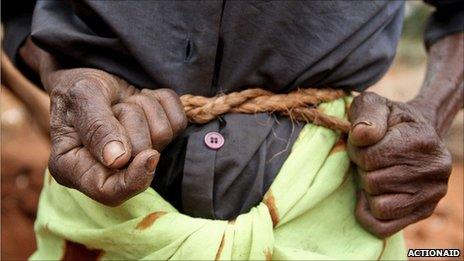Who, what, why: What is a famine?
-
Published

The United Nations has declared a famine in two regions of southern Somalia, as it suffers the worst drought in more than half a century. When does mass starvation turn into a famine?
Aid agencies and international organisations call it the f-word.
Famine is an emotive word, and while in the strict sense it means people are starving on a massive scale, aid organisations do not use it lightly to describe a humanitarian crisis.
"It is a very strong word, with a strong impact," the DEC's Brendan Paddy told the BBC.
"We have to be precise about how we use it. We have to raise the alarm before it's too late, but we also don't want to be accused of crying wolf."
Most major aid agencies - the FAO, the WFP, the Famine Early Warning Systems Network, Save the Children UK, CARE International, the European Commission Joint Research Centre and Oxfam - only describe a crisis as a famine when the situation on the ground reaches level five on the Integrated Phase Classification (IPC) system. This means:
- at least 20% of the population has access to fewer than 2,100 kilocalories of food a day
- acute malnutrition in more than 30% of children
- two deaths per 10,000 people, or four child deaths per 10,000 children every day
It is usually up to governments to declare a famine.
But in the case of Somalia, the UN stepped in because of the lack of central government.
The classification system was created by the UN in 2005 to objectively classify need to help allocate resources. It uses information from surveys conducted by the UN and other agencies on the ground.
Ian Bray, of international aid agency Oxfam, says just because a situation is officially a famine does not mean it was not a crisis beforehand.
"It gives us an idea of the level of human suffering. If it is at level four, it is a huge crisis. If it is at level five [officially a famine], it is a massive crisis."
Calling a famine helps raise awareness of the crisis - and it can help raise emergency funds.
"Using the f-word gives a very strong message to donors and politicians. It brings in publicity and puts it on the news agenda - without it, the public doesn't know it is happening."
Bad image?
Aid agencies are not the only ones to exercise prudence. The word famine is politically contentious, and governments also shy away from using it.
Ireland, Russia and Ethiopia have at various times struggled to move away from their image as famine-ravaged countries.
More recently, in 2005, Niger's President Mamadou Tandja lashed out at the international community's use of the word in relation to his country. According to the UN's criteria, he was right.
Governments believe the f-word has too many negative political associations, says Simon Levine, a research fellow with the Overseas Development Institute, a UK think-tank.
"It's the spectre of what happened in Ethiopia in 1984, it's a sign of failure. Famines have brought down governments," he says.
And declaring a famine can create more problems, he says, because often donors do not respond until a famine - or at least an emergency - has been declared.
Other governments are simply less willing or able to deal with crises, says the BBC's international development correspondent Mark Doyle.
"The situation in the Horn of Africa is a humanitarian crisis, but its roots and potential solutions are almost entirely political," he says.
"Many other countries have little water, but what they do have are structures and mechanisms to deal with that. In the case of Somalia, such structures are almost completely absent because of the political failures there to create and sustain a modern nation state."
For those who are starving, whether or not their plight is a famine or an emergency makes little difference.
"It is already clear that they need immediate assistance," says Oxfam's Ian Bray.
Additional reporting by Alizeh Kohari